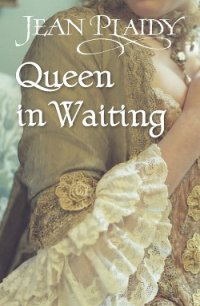The Prince and the Quakeress - Plaidy Jean (книги полностью бесплатно TXT) 📗
‘And you think that only marriage to you can save her?’
‘I know it.’
‘But, George, what will this mean to you?’
‘It is not time to think of myself. I must think of her.’
‘You say she is near death?’
‘She feels it. If I lost her I should never be happy again, but I think I should find some comfort if I could clear her conscience. If I could think of her through the years ahead as happy in paradise I shall have some modicum of comfort. Then I shall devote myself to doing my duty.’
‘George,’ said Elizabeth earnestly, ‘why has this feeling suddenly come to you?’
He looked at her strangely. ‘I do not know. I have a feeling that Hannah will not be long with me. She is to have a child again and I sense that all is not well. It is like a great burden on my shoulders. I think that if Hannah died...in sin...I should never know peace as long as I lived.’
‘Has Dr. Fothergill seen her?’ asked Edward.
‘No. She does not wish to see him. He will deliver the child as usual when the time comes.’
‘And that time will be soon?’ asked Elizabeth.
George nodded. ‘I have made up my mind about this. Edward, I need your help.’
‘You know that I will do all in my power.’
‘You must be a witness of our marriage.’
‘But,’ cried Elizabeth, ‘have you thought deeply enough of this? Have you considered all it will mean?’
‘I have considered everything.’
‘If you married Hannah she would be...Queen.’
‘And none more fitted.’
‘Oh, I am sure of that, but...will your ministers think so? What of the people? George, dearest brother, you have your duty to the crown.’
‘I have my duty first to Hannah.’
Elizabeth looked at Edward and then at George, who died out: ‘Would you have me send Hannah to the Judgment scat with this sin upon her?’
Elizabeth interrupted: ‘I cannot believe that a sin is expiated so simply in God’s eyes.’
‘Oh, Elizabeth, you do not see. We have sinned, both of us. I should never have taken her away from her people; she should never have come. We must pay for our sins. Her payment could be to go to her Maker in sin; mine is to marry, no matter what are the consequences. It is the only way we can right that wrong we did when I took her away from her people and she came. Edward, will you come with me? Will you witness our wedding?’
‘Certainly I will, George, when you decide to make this marriage.’
‘I have decided.’
Edward looked at Elizabeth and lifted his shoulders helplessly.
‘Wait,’ cried Elizabeth. ‘Let us send the best doctors to Hannah, let them cure her...then there will be no immediate need for marriage. Everything could go on as it is then for a while, until we have planned what would be the best thing to do.’
‘And if you married Hannah on her death-bed...then...that would not matter for you would be unmarried on her death and could make another marriage...the one which was chosen for you.’
‘Please do not talk of Hannah as though she is dead. Hannah is not going to die. She is going to live and I am going to marry her.’
• • •
‘Can he mean it?’ whispered Elizabeth.
‘I am sure he does,’ answered Edward.
‘Oh, Edward, what will happen?’
‘Trouble, great trouble. Unless, of course, she is married on her death-bed. Then he is left free. That is what we must hope for.’
‘Hope for Hannah’s death?’
‘My dear sister, how else can our brother marry this woman except on her death-bed. It would be disaster to do so.’
‘You must persuade him against it, Edward. And I must do the same.’
‘Dear sister, George is slow to come to a decision, but when he has reached it he is as stubborn as a mule. I have seen something in his face tonight.’
‘And that was?’
‘A determination to marry Hannah Lightfoot.’
• • •
The closed carriage rumbled out of the private drive. In it sat a lady well muffled up in a concealing cloak and hood; she was heavily pregnant. Beside her sat her maid, anxiously glancing at her from time to time, for it was clear that the lady was ill.
The carriage stopped in Curzon Street and the occupants alighted and hurried into the chapel there.
There they were greeted by the Prince of Wales and his brother, Edward, Duke of York.
The young Duke bowed and looked with wonder into the beautiful face of the woman who had so deeply affected his brother.
‘Are you well?’ asked the Prince anxiously.
‘I am at peace,’ answered Hannah, ‘but I fear for you.’
‘All will be well. Fear not.’
He had never looked so handsome as he stood there before Dr. Wilmot whom he had commanded to perform the ceremony. Resolute, determined, he believed he was acting in the only manner possible to an honourable man. Whatever the consequences, he would no longer be tormented by his conscience. He had sinned and this was the only way in which he could expect forgiveness in God’s eyes.
So, with his brother as witness, on that day in the year 1759, the Prince of Wales was married to Hannah Lightfoot.
The Grave at Islington
Elizabeth Chudleigh had been to Winchester on a very special mission so it was not until later that she discovered what was happening at Court.
A wise woman, Elizabeth told herself, must keep her eyes open for advantages and when they came seize them; she was a wise woman, and the folly of one day could by a strange turn of fate become the wise action of another.
She lived dangerously; she expected to and she liked to; of one thing she was certain and that was that Elizabeth Chudleigh would draw the utmost advantage of life. Elizabeth Chudleigh! She was Elizabeth Hervey now; and there was going to be no secret about that.
It was many years since she had married the Honourable Augustus John Hervey; she had been piqued at the time because she believed the Duke of Hamilton, whom she had hoped to marry, had deserted her. She had met Augustus at the Winchester races whither she had gone when she was staying at the house of her uncle and aunt, Mr. and Mrs. Merrill, in Larnston, Hampshire. Knowing that Augustus came from a good family – he was a grandson of the Earl of Bristol – the Merrills had encouraged the match and she had agreed to marry him.
She soon was under the impression that she had acted rashly; and deciding to keep her marriage a secret did not mention it when she returned to Court. Augustus, who was a sailor by profession was not in England for long spells but when he was, he expected to live with his wife. Elizabeth’s plan had been to spend her time between the Court and her mother’s house in Conduit Street; and when she was there Augustus would be with her and insist on his conjugal rights. Elizabeth was nothing loath; the only condition she had demanded was that the marriage should be kept a secret.
In her heart she always believed that one day some great opportunity would come along. She intended to be a Duchess at least and when that opportunity came she did not wish to be hampered by a marriage to a nobody, which was all Augustus was at the time. Augustus did not seem to mind the secrecy as long as he was not excluded from her bed when he desired to be there. That had to be accepted and was no hardship, he being a personable young man; but there followed the inevitable result which caused her a great deal of trouble. In spite of voluminous skirts these predicaments have a way of showing themselves and it soon became char to Elizabeth that she would have to stage a little act. She would have to leave Court to take the air, she announced; there were smiles behind fans and whispers in corridors; much Elizabeth cared. She left Court and gave birth to a boy—christened Henry Augustus—and she put him out with a suitable family to be cared for. He did not live long, poor child, and she had soon forgotten him. She returned to Court, where acquaintances were inclined to make too tender enquiries after her health.




